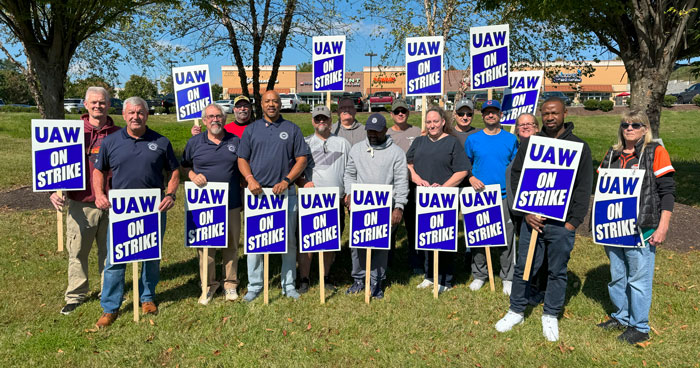In a sudden and bold move, the United Auto Workers (UAW) halted production at Ford’s largest global plant, marking a significant escalation in their targeted strike against major Detroit automakers. The UAW’s unexpected shutdown of the Kentucky truck plant, which produces Ford’s lucrative pickup trucks, highlights their stance in the ongoing contract negotiations.
UAW Halts Production at Ford’s Kentucky Truck Plant
The UAW reported that 8,700 of its members working at Ford’s Kentucky truck plant initiated a strike after the union claimed that the automaker had refused to make further concessions during contract bargaining.
Demands for Wage Increases and Union Expansion
Although automakers have offered substantial wage hikes and agreed to raise wages in line with inflation while enhancing the pay for temporary workers, the UAW is demanding even higher wages. They are also pushing for the elimination of the two-tier wage system and the expansion of unions into battery plants at all three major automakers.
Impact on Ford’s Profitability and Shares
Ford’s Kentucky truck plant is its most profitable operation, generating an impressive USD 25 billion in annual revenue, roughly a sixth of the company’s global automotive revenue. Consequently, the UAW’s decision to shut down production lines building Ford Super Duty pickup trucks and large SUVs could undermine Ford’s full-year profits. The company’s shares dropped approximately 2% in after-hours trading following the plant’s shutdown.
UAW’s Uncompromising Stance
UAW President Shawn Fain and other union officials met with Ford and demanded a new offer, which Ford reportedly did not have. This uncompromising stance was evident when Fain stated, “You just lost Kentucky Truck. Our members’ lives and my handshake are worth more than this.”
Ford’s Reaction
Ford expressed strong disapproval of the UAW’s decision, deeming it “grossly irresponsible” and part of the union’s strategy to cause “reputational damage” and “industrial chaos.”
Impact on General Motors and Stellantis
The UAW’s actions serve as a warning to General Motors and Stellantis, whose wage and benefits offers have fallen short of Ford’s. Fain indicated that he was ready to strike GM’s assembly plant in Arlington, Texas, which produces Cadillac Escalade and Chevy Suburban, among other high-priced SUVs.
Strategies to Press for a Richer Contract
The UAW is set to engage in another round of bargaining with Stellantis, with the union likely to leverage the expected robust profits of the Detroit automakers, who will report third-quarter financial results later this month, to further their demands.
Escalation of the Strike
The UAW’s aggressive stance and willingness to escalate strikes have disrupted the operations of the Detroit Three automakers, and both sides find themselves in uncharted territory.
Uncharted Territory for Both Sides
This uncharted territory poses challenges for both the union and Ford, with the UAW employing a strategy that has not been used before, and Ford experiencing such a strategy for the first time in its history.
Continuing Negotiations
Negotiations between the UAW and the Detroit automakers are ongoing, with discussions between GM and the UAW focusing on allowing workers at joint venture battery plants to be covered by union contracts.
Upcoming Bargaining
The UAW and Stellantis are scheduled for another round of bargaining, while the Detroit automakers will report their third-quarter financial results in the coming weeks.
Despite these disruptive actions, only approximately 22% of the 150,000 UAW workers at the Detroit Three automakers are on strike. Nevertheless, the thousands of additional workers have been furloughed due to the strikes, which have rendered their work unnecessary.
Implications beyond the Kentucky Plant
The impact of the Kentucky plant’s shutdown extends beyond the sprawling factory near Louisville. Workers at a dozen other Ford plants that supply engines, transmissions, and other components to the Kentucky plant may face furloughs. Moreover, suppliers providing parts to the plant’s trucks and SUVs could also be compelled to temporarily lay off workers.
The UAW’s strategic disruption remains a key force in the ongoing negotiations with Detroit’s major automakers.



